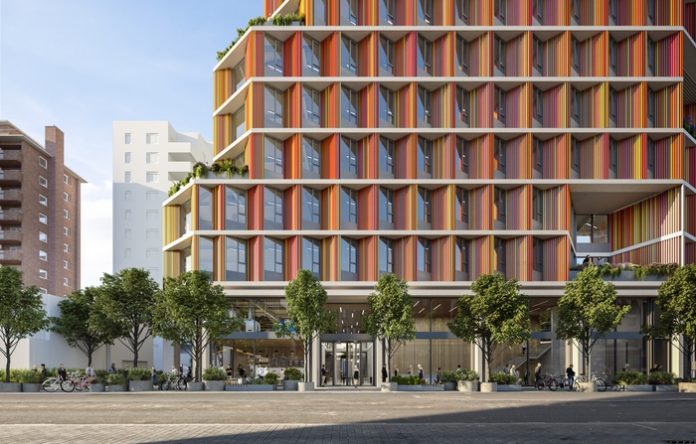Transport for London (TfL) has been awarded a GRESB 5 Star rating, recognising that it is a leader by GRESB – with an overall score of 93 out a maximum of 100. GRESB is one of the leading environmental, social and governance benchmarks for real estate and infrastructure investments across the world, examining their environmental, social and governance performance.
It is the first time that TfL has participated as part of the real estate benchmarking assessment process and the result is outstanding for a first-time entrant. This ranking reflects TfL’s passionate commitment to sustainability as its property development programme continues to build momentum, with both residential and commercial office proposals being taken forward. The entry this year focused on TfL’s property development portfolio under the GRESB development and management modules, with the aim of entering TfL’s operational estate under the performance module in the future.
Core to TfL’s entry was the creation of a Sustainable Development Framework, a bespoke approach to delivering best-in-class outcomes across three core sustainability objectives of supporting local prosperity, promoting vibrant and diverse communities, and creating healthy places for people and planet. This framework, which will be formally launched next year, combines an ambitious vision with hard metrics, stretching targets, and clear guidance to deliver industry leading results. It was this focus on performance and on-the-ground delivery that earned recognition from GRESB as sector-leading and contributed significantly to TfL’s overall score.
Also contributing to TfL’s strong showing was its approach to its own staff, ensuring that it fosters a working environment that enables employees to stretch themselves while looking out for their wellbeing. TfL recognises the benefits of a diverse workforce that can deliver within an inclusive culture. This is why TfL has an evidence-based approach to diversity and inclusion that hard-wires thinking about this key business issue into all of its work – from hiring to retiring, leadership to behaviour, wellbeing to talent management.
Derek Wilson, Head of Sustainability, TfL Commercial Development, said: “We are thrilled to have received this outstanding GRESB result for our first ever assessment. It is a testament to the whole team’s commitment to put sustainability at the heart of our development programme, making sure that we drive real positive changes for local communities, tenants and residents through our developments. Our development partners, including Grainger plc, have embraced our approach and we are very excited to be working with our partners to deliver the most sustainable development programme in London.”
Jonathan Sykes, Executive Chairman, Carbon Intelligence said: “Congratulations to TfL on their remarkable GRESB result. This outstanding first-time score shows what can be achieved through ambitious targets, a rigorous framework and extensive stakeholder engagement.”
As more of TfL’s development proposals progress through planning and construction, the targets for external certification have also contributed to its GRESB result. The programme seeks for the majority of its developments, including those that it is taking forward with Grainger as part of Connected Living London (CLL), to achieve 4 Stars or higher under the Home Quality Mark system. TfL also seeks to achieve a rating of Excellent or Outstanding for its retail and office developments under BREEAM, the industry standard rating system for the sustainability of office and retail.
For example, the proposals for TfL’s over station development at Southwark Tube station, which are currently being considered as part of the planning process, have been designed to achieve BREEAM Outstanding, which would put it among the most sustainable office buildings in the world. The scheme is also designed to achieve the highest possible rating of Platinum under the WELL standard, a certification for health and well-being which has been obtained by only one other building to date in the UK. The building would be constructed from hybrid steel and cross-laminated timber frame, reducing its weight and helping to ensure construction efficiency, minimal waste and a significant reduction in embodied carbon. It would also use waste heat from the Tube station below, alongside air source heat pumps and solar panels, to make carbon dioxide savings and encourages sustainable transport through cycle parking and improvements to the public realm.
TfL’s approach to stakeholder management also played a vital role in TfL’s GRESB ranking. It has an overarching strategy, which is driven by two key principles: ‘putting people at the heart of development’ and ‘acting as an exemplar steward of public assets in the long term’. This is embedded throughout each development’s tailored communications plan and engagement strategy, which is designed to recognise the unique challenges and opportunities for each site.
CLL – the formal partnership between Grainger plc and TfL – has undertaken extensive and meaningful consultation for its schemes within the local areas, not least having spent more than 110 hours talking to the local community at exhibition events, pop-ups and public consultations with more than 1,000 attendees and sending updates to more than 50,000 people. It also adapted its approach when sites were located in communities that had groups of people that were typically hard to reach or less likely to engage. For example, for one scheme, as well as using a mix of traditional and digital methods, such as door-knocking and online polls, CLL took out local newspaper and radio adverts for their events, and translated consultation materials, newsletters and its website to make these more accessible for local residents as required.






















